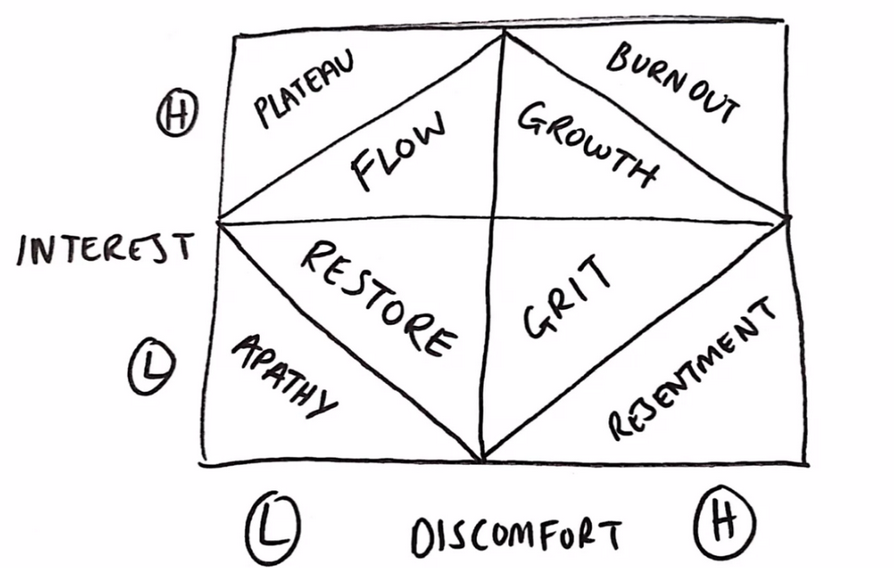This week’s 12 links:
- Photographic work by Endia Beal: she explores various themes of minority women existing in mainstream USA. I saved this page for the 2013 project called Can I Touch It?which tackles what looks “professional” in a corporate setting. Associated HuffPost article here.
Tags: EDI - Gender exploration and transition doulas: I’m interested in the concept of doulas, and particularly end of life doulas. Interesting to find doulas working with other major life transitions too.
Tags: EDI - The Quitting Quadrant by Sarah Weiler, on the Stewarding Loss website: a really neat model which takes the 2×2 matrix and adds some nuance to Discomfort x Interest – a positive and negative side to each quadrant. (See diagram below at end of post).
Tags: personal growth - Conflict analysis tools on the Everyday Peacebuilding website:
* the conflict tree (causes / core problem / effects)
* the PIN model (positions / interests / needs)
* the conflict timeline
The conflict tree was new to me, so keeping this for reference to use sometime.
Tags: conflict - The Merriam-Webster Slang Dictionary: no idea why I saved this!
- Dead link, apparently about Scottish Gaelic.
- Systems thinking and systemic design: working with complexity – a summary article by Will Allen about thinking in systems, co-design, adaptive learning, and tools / practice. I’m always reading about complexity and systems change, because everything is complexity.
Tags: complexity - Don’t blame AI – Blame Capitalism and/or Authoritarianism: a thoughtful piece and not an argument *for* AI so much as raising points around the broader context: “it’s the economic system that’s the problem, not the technology”. Also a good mention of the Luddites, I always appreciate that accuracy! “The Luddites were not anti-technology. They were a labour movement that fought to give workers control over a technology that was advancing without oversight and rapidly automating them out of their jobs. They wanted to see technology used for the betterment of all, and not as a tool that harmed workers and helped only the wealthy. They didn’t see technology as a problem. The problem was how technology was being used by mill and factory owners (Capitalists) to exploit workers, diminish their power and turn workers wages into higher company profits.”
Tags: anti-capitalism (a new tag, could be useful again in future) - Organizmo! The Colombian architects overturning colonialist ‘sustainability’ ideas – article by Oliver Wainwright about an inspiring project in Columbia de-colonizing architecture and drawing on ancestral and indigenous knowledge, for sustainability and ecological impact.
Tags: hope (another new tag, I should make use of this one more) - The pollinator corridor project that’s transforming Melbourne’s streets – article by Helen Cushing about a project to increase biodiversity in cities lead by a visionary and inspiring local resident.
“If you want to start street gardening or a pollinator corridor, you need to realize that you’re changing the culture in your street. That takes time. Start small, make sure it’s looked after and it’s not too much for you. Dream big but start small.
The role of community is immense. We’re trying to change urban systems and bring community along for the ride. It’s not your garden – it’s everyone’s garden. Realize this and the more success and joy you will have.
I believe street gardening is one of the most amazing things you can do in an urban environment. Nature wants to be around us. The birds are there. It’s time to invite them in.”
Tags: hope, community - Chinese, but not a Chinatown: The rise and rise of Dominion Road – article by Eda Tang about immigration and culture, history and food, in Auckland, New Zealand. One of my random social media network finds, of interest to me as I explore and connect with my family roots in Singapore and China, and the Chinese diaspora.
- A list of meeting ground rules for meetings and workshops. While I’d usually create the ground rules with each group, it’s handy to have a big list for inspiration and ideas, especially as these are presented neatly as values and principles, with a strong focus on inclusivity and respect.
Tags: facilitation
My time to read:1 hour 15 minutes

Credit: Stewarding Loss website
